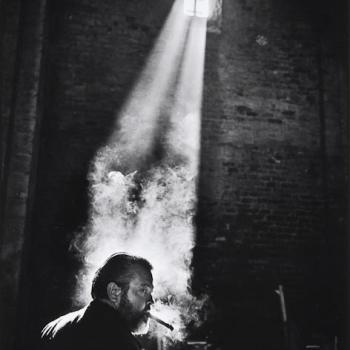These sorts of ideas go back as far as Plato’s Republic, but Wimbledon writes in a historical moment fraught with tension and fear. Richard II’s reign was troubled after a mass outbreak of disease and a rebellion against the powers that be. Documents were burned; a bishop was killed. Society seemed as if it might fundamentally change. Wimbledon argued that the problem was too much change, not too little. If people stayed in their place, we wouldn’t be in this predicament. The poor rebel because nobles are unjust; nobles feel they have free reign because no one respects all the churchmen acting like secular people. That sort of thing. Wimbledon makes this clear from the git-go, opening the sermon with: “My dear friends, you should understand that Christ Jesus, author and preserver of truth, in his Gospel book likens the kingdom of heaven to a householder.” (my translation)
It is easy to see how one might see this as fascism. Wimbledon wants the classes to remain divided. Harmony can only spring if each part of society does its job. The household must be kept in order. This, however, is not the way in which fascism tends to speak of the “body politic.” Recall Paxton’s favored quotation from The Leopard: “If we want things to stay the same, things will have to change.” Were Wimbledon telling the peasantry they had to overthrow the nobility to return to a truly just, well-ordered society, one with properly running estates, that might look something more like fascism. But that it is not.
What, then, separates the two? Wimbledon’s sermon does not preach unity in the name of a unified enemy (though he undoubtedly thought the France of the Hundred Years War was a threat); rather, he subordinates the entire community to God, to what he views as an imminent apocalypse. Souls are more important than bodies here, and the running of the “body of England” is far less important than the ordering of the “Body of Christ.”
I am reminded of a recent Twitter exchange. I posted a thread about anti-Nazi Catholic martyrs and confessors that was picked up and responded to by a specific “Catholic” organization that, point blank, said such people were not “martyrs” because they refused to obey the state. This, rather baldly, is fascism. This person or people fervently believed that anything standing in the way of a healthy “body politic” had to be eliminated (and thus could be eliminated justly).
The fascist, in a sense, literalizes the metaphor of the body politic; it attempts to transform the individual physiques of citizens and deploys the rhetoric of dehumanization to transform foreign elements into pests ripe for expulsion. We do not, as far as I know, see this in mainstream medieval metaphors concerning the body politic. The eschaton stands all-encompassing and ready to relativize the historical destination of any one nation, state, or body, besides that, of course, of the battered and bruised Christ.
Tracing these differences matters because it’s easy to see how these resonances could be used to the benefit of fascism, how linguistic similarities can draw in and entrap the impressionable, as happened in Vichy France and would-be Rexist Belgium. Overlaps of language must be investigated, their true contents laid bare, and their implications drawn out—and not merely (though partly) for antiquarian reasons. I hope to have done some of that today.













